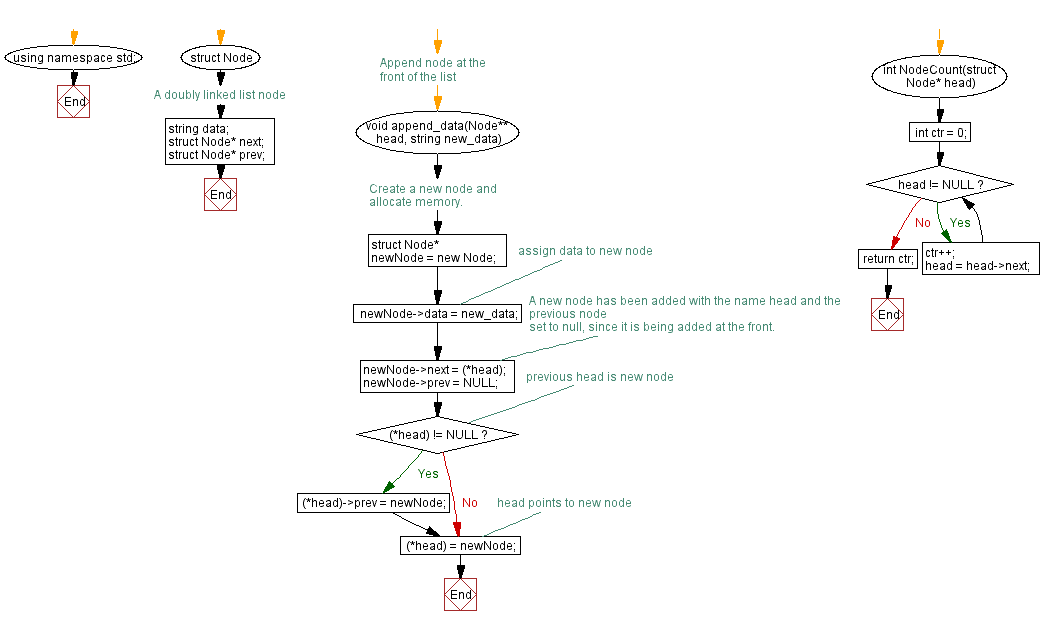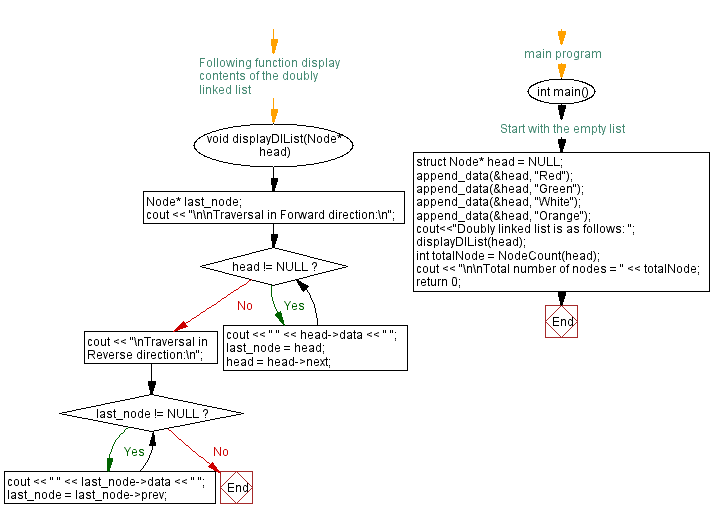C++ Linked List Exercises: Count number of nodes in a doubly linked list
17. Count Nodes in a Doubly Linked List
Write a program in C++ to create a doubly linked list of n nodes and count the number of nodes.
Test Data:
Doubly linked list is as follows:
Traversal in Forward direction:
Orange White Green Red
Traversal in Reverse direction:
Red Green White Orange
Total number of nodes = 4
Sample Solution:
C++ Code:
#include <iostream> // Including input-output stream header file
using namespace std; // Using standard namespace
// A doubly linked list node
struct Node {
string data; // Data field to store string data
struct Node* next; // Pointer to the next node
struct Node* prev; // Pointer to the previous node
};
// Function to append data at the front of the doubly linked list
void append_data(Node** head, string new_data)
{
// Create a new node and allocate memory.
struct Node* newNode = new Node;
// Assign data to the new node
newNode->data = new_data;
// A new node has been added with the name head and the previous node
// set to null, since it is being added at the front.
newNode->next = (*head);
newNode->prev = NULL;
// Previous head is the new node
if ((*head) != NULL)
(*head)->prev = newNode;
// Head points to new node
(*head) = newNode;
}
// Function to count the number of nodes in the doubly linked list
int NodeCount(struct Node* head)
{
int ctr = 0; // Counter to count the nodes
while (head != NULL) { // Loop through the linked list until the end is reached
ctr++; // Increment the counter for each node encountered
head = head->next; // Move to the next node
}
return ctr; // Return the total count of nodes
}
// Function to display contents of the doubly linked list
void displayDlList(Node* head)
{
Node* last_node;
cout << "\n\nTraversal in Forward direction:\n";
while (head != NULL) {
cout << " " << head->data << " "; // Displaying data in forward direction
last_node = head;
head = head->next;
}
cout << "\nTraversal in Reverse direction:\n";
while (last_node != NULL) {
cout << " " << last_node->data << " "; // Displaying data in reverse direction
last_node = last_node->prev;
}
}
// Main program
int main() {
/* Start with the empty list */
struct Node* head = NULL; // Initializing the head of the linked list as NULL
append_data(&head, "Red"); // Appending "Red" at the front of the list
append_data(&head, "Green"); // Appending "Green" at the front of the list
append_data(&head, "White"); // Appending "White" at the front of the list
append_data(&head, "Orange"); // Appending "Orange" at the front of the list
cout<<"Doubly linked list is as follows: ";
displayDlList(head); // Displaying the doubly linked list
int totalNode = NodeCount(head); // Calculating the total number of nodes in the list
cout << "\n\nTotal number of nodes = " << totalNode; // Displaying the total number of nodes
return 0; // Returning from the main function
}
Sample Output:
Doubly linked list is as follows: Traversal in Forward direction: Orange White Green Red Traversal in Reverse direction: Red Green White Orange Total number of nodes = 4
Flowchart:


For more Practice: Solve these Related Problems:
- Write a C++ program to count the number of nodes in a doubly linked list and display the total count.
- Develop a C++ program that builds a doubly linked list and uses recursion to count its nodes.
- Design a C++ program to create a doubly linked list and display each node's data along with a running node count.
- Implement a C++ program to count nodes in a doubly linked list while checking for inconsistencies in pointer assignments.
Go to:
PREV : Display Doubly Linked List in Reverse Order.
NEXT : Insert Node at the Beginning of Doubly Linked List.
C++ Code Editor:
Contribute your code and comments through Disqus.
What is the difficulty level of this exercise?
